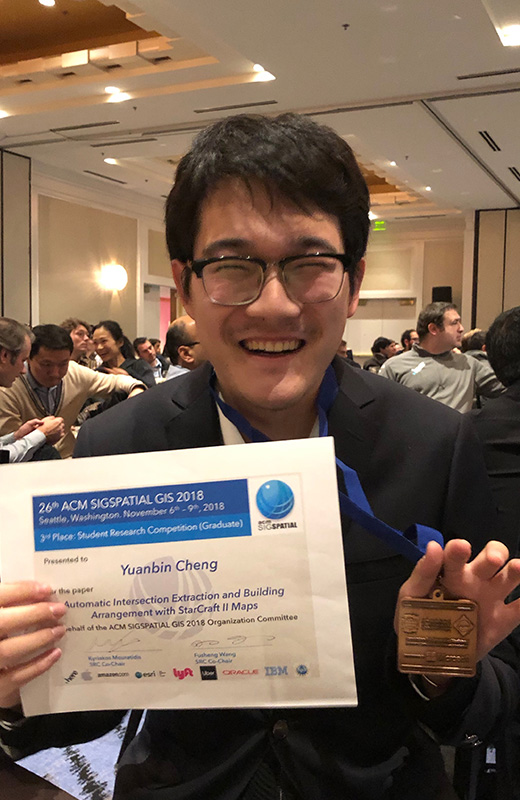Yao-Yi Chiang’s Spatial Computing Lab continues award-winning streak
On November 9, 2018, Yuanbin Cheng, a M.S. student in computer science on the Spatial Sciences Institute’s Spatial Computing team, took the third place award for student research competition at the 26th ACM International Conference on Advances in Geographic Information Systems (ACM SIGSPATIAL) in Seattle, Washington.

Cheng’s submission, "Automatic Extraction Intersection and Building Arrangement from StarCraft II Maps”, describes an automatic method for identifying critical intersections on game maps for AI (artificial intelligence) robots to effectively build defensive mechanisms.
The ACM SIGSPATIAL conference is the premier event which brings together researchers, developers, users, and practitioners in relation to novel systems based on geospatial data and knowledge, and fostering interdisciplinary discussions and research in all aspects of geographic information systems. The conference provides a forum for original research contributions covering all conceptual, design, and implementation aspects of geospatial data ranging from applications, user interfaces, and visualization to data storage and query processing and indexing.
Cheng and the students of the Spatial Computing team work under the direction of Dr. Yao-Yi Chiang, associate professor (research) of spatial sciences with the USC Spatial Sciences Institute. Chiang said, “I am very proud of Yuanbin’s achievement. He did very well in both his poster and oral presentations. All other competitors are Ph.D. students in geography or computer science, so you can see the great novelty in Yuanbin’s work as a masters student.”
Cheng’s award comes on the heels of other major prizes garnered by the Spatial Sciences Institute’s Spatial Computing Lab. Last year, Spatial Computing Lab’s student Haowen Lin won first place in the 2017 ACM SIGSPATIAL student research competition for her research on “Automatic Extraction of Phrase-Level Map Labels from Historical Maps”, and Weiwei Duan, a Ph.D. student in computer science and spatial sciences, was one of three winners in the 2018 U.S. Geospatial Intelligence Foundation/NVIDIA’s GPU Essay Challenge.




